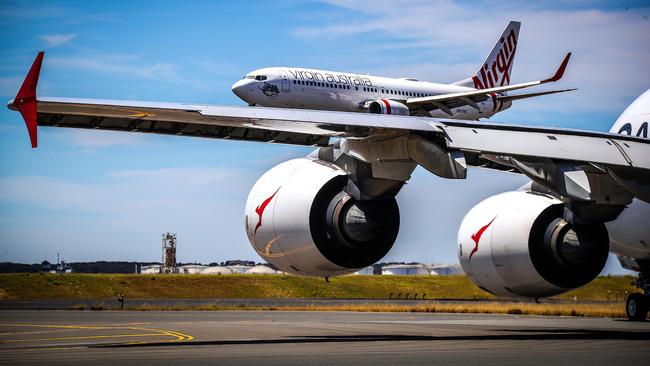Domestic flight chaos blamed on airspace restrictions between Brisbane and Sydney
Scores of flights have been delayed and many cancelled due to airspace restrictions in the busy Brisbane-Sydney corridor.

Business
Don't miss out on the headlines from Business. Followed categories will be added to My News.
Dozens of flights have been cancelled or delayed along the nation’s east coast on Thursday due to a severe shortage of air traffic controllers that led to the effective closure of airspace to the south of Brisbane.
A Qantas spokesman said 100 flights had been delayed across the group, and 10 services were cancelled because of the airspace restrictions.
Virgin Australia was also hit hard. Flights to and from Brisbane, the Gold Coast and Ballina were forced to operate around the uncontrolled airspace, which added time and distance.
A spokeswoman said it was Virgin Australia’s position to not operate in “TIBA” airspace where possible for safety reasons. TIBA stands for traffic information broadcasts by aircraft, which means aircraft have to self separate and rely on radio broadcasts rather than air traffic control.
“Some delays are expected due to longer flying times, departure spacing and reduced capacity at these airports,” the spokeswoman said.
“We apologise to our guests for an inconvenience caused by this closure of airspace due to a shortage of air traffic controllers.”
An Airservices Australia spokeswoman confirmed the airspace restrictions from 6am to 1.30pm on Thursday due to “short term, unplanned air traffic controller leave impacting en route airspace between Sydney and Brisbane”.
“During this period, we will manage the airspace safely by implementing internationally recognised procedures and continuing to provide a flight information service, a search and rescue alerting service and a safety alerting service using an air traffic controller who will monitor the frequency the pilots are operating on and surveil the airspace,” the spokeswoman said.
“Our traffic management plan includes issuing routes around the airspace into adjacent airspace to minimise disruption to our customers.”
She said Airservices was “continuing to invest in its workforce across Australia including by recruiting and training new air traffic controllers nationwide”.
Airservices was “enhancing its service resilience by recruiting more than 50 trainees nationwide in the next three months to add further depth to our air traffic control rosters,” she said. “A total of 80 air traffic controllers are due in the 2024 financial year.”
It’s the latest in a long series of issues arising from air traffic controller shortages, to the frustration of airlines and airports.
The CEO of Ballina-Byron Bay Airport recently wrote to Airservices to complain that frequent airspace closures were undermining the gateway’s reputation.
Transport Minister Catherine King has also taken up the issue with Airservices chairman John Weber, which resulted in the recruitment drive.
Air traffic controllers, who spoke with The Australian on the condition of anonymity, said the increase in airspace closure was due to the large loss of experience during the pandemic through a retirement incentive scheme.
“Approximately 120 controllers were paid handsome sums to retire early on the presumption that flights would not return to pre-pandemic levels till 2025 – a prediction that has now come back to bite Airservices hard,” one controller said.
“Covering vacant shifts with large amounts of overtime is proving to be essential just to keep the major sectors open, but after 12 months this is wearing thin.”
Originally published as Domestic flight chaos blamed on airspace restrictions between Brisbane and Sydney



